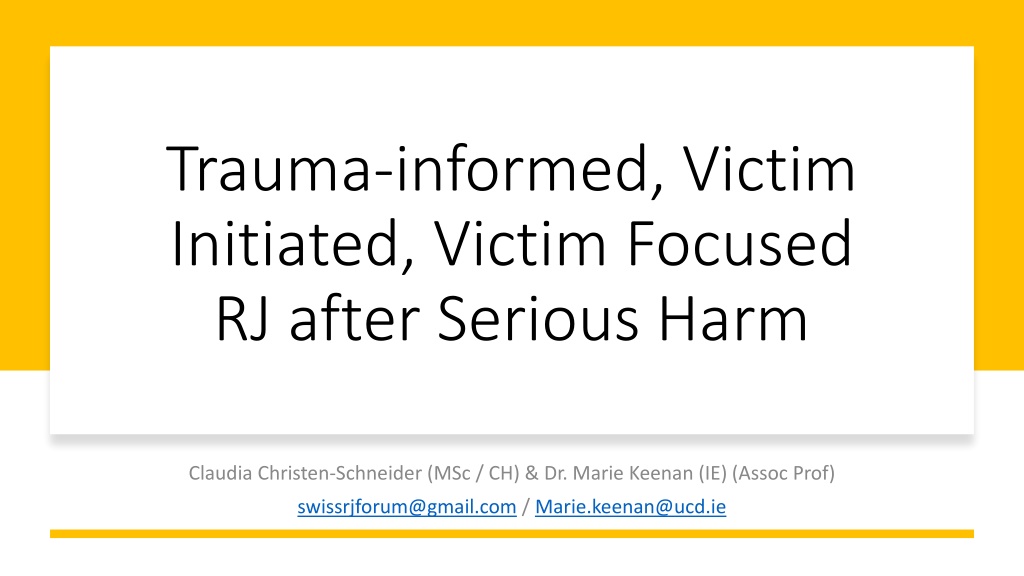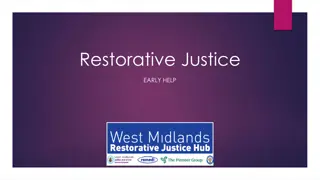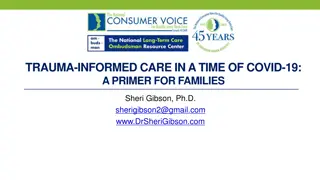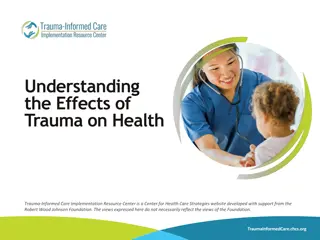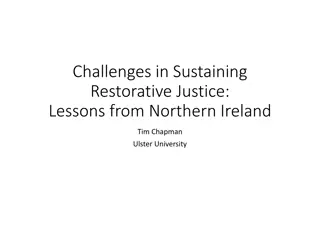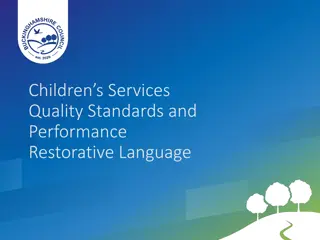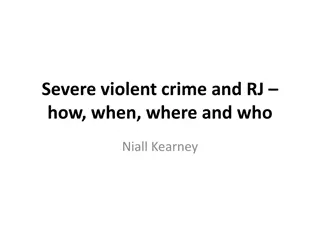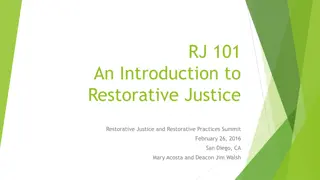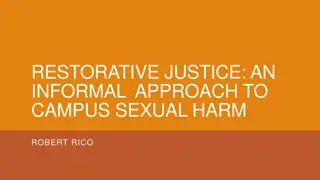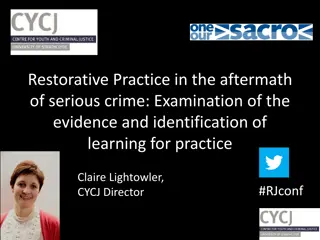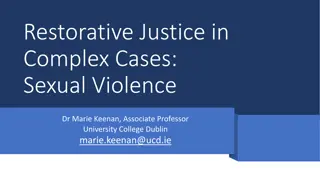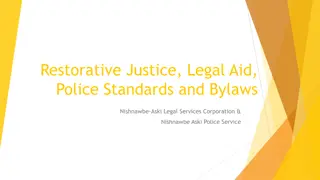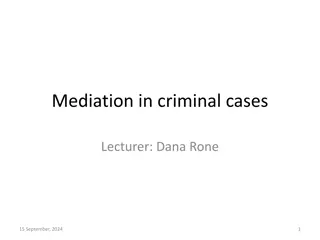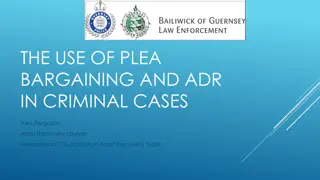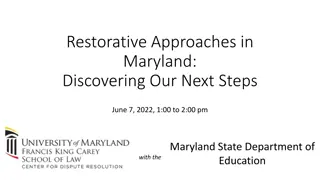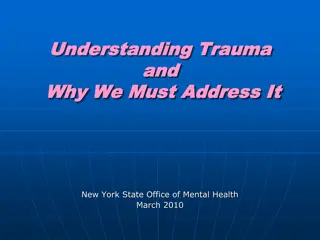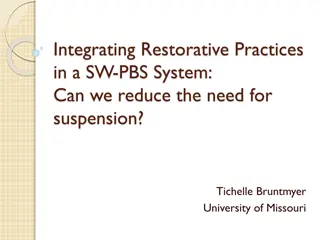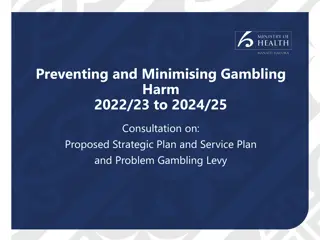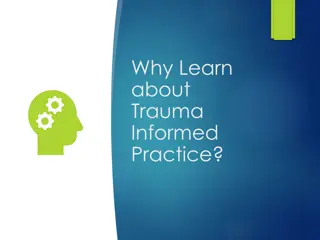Understanding Trauma-Informed Restorative Justice for Victims of Serious Harm
Exploring trauma-informed restorative justice (RJ) practices initiated by victims and focusing on their needs after serious harm. Addressing the effects of trauma, redefining empowerment, and proposing changes in RJ theory to better support healing and restoration in cases of significant harm.
- Trauma-informed RJ
- Victim-centered approach
- Healing and restoration
- Empowerment in justice
- Serious harm support
Download Presentation

Please find below an Image/Link to download the presentation.
The content on the website is provided AS IS for your information and personal use only. It may not be sold, licensed, or shared on other websites without obtaining consent from the author. Download presentation by click this link. If you encounter any issues during the download, it is possible that the publisher has removed the file from their server.
E N D
Presentation Transcript
Trauma-informed, Victim Initiated, Victim Focused RJ after Serious Harm Claudia Christen-Schneider (MSc / CH) & Dr. Marie Keenan (IE) (Assoc Prof) swissrjforum@gmail.com / Marie.keenan@ucd.ie
Outline of presentation Trauma Informed RJ after serious harm and what this means for RJ Theory and Practice (Claudia Christen) Victim Initiated, Victim Focused RJ after serious harm and what this means for RJ Theory and Practice (Marie Keenan) Examines Potential Benefits of these Perspectives for RJ (Marie Keenan) Discussion and Critical Examination
Trauma can be caused by various events or circumstances (or neglect) Response to a terrible situation that overwhelms an individual s ability to cope (Bizu Gelaye) The essence of trauma is overwhelming, unbelievable and unbearable - speechless horror (Bessel van der Kolk) Impacts body and brain Interpersonal violence: high potential for longlasting, damaging traumatic effects - especially SV We never know if a person is affected or not if we don t know their whole story Trauma and its prevalence
What is trauma-informed practice (TIP)? Know and understand about trauma Realize Recognize Respond Resist retraumatisation
Are we not already trauma- informed in RJ?
Why TIP? Countering the effects of trauma Fear / Terror Safety Disconnection, isolation, rupture of relationships Trust Choicelessness, lack of control Choice Feeling at the mercy of someone else Collaboration Disempowerment, speechlessness, senselessness Empowerment
Need to change RJ theory or rather become more explicit in what we mean - implications for serious harm? Do we need to define what being trauma-informed truly means in RJ for theory and practice? Empowerment: often vague in RJ theory - redefine it in the light of a trauma-informed approach - or at least define it more clearly? Language: How trauma-sensitive is the current RJ terminology? Do we need to rethink it, especially in cases of serious harm? Goals: offender-focused (e.g. crime reduction)? More focus on healing & restoration? Definition of healing? Relational and narrative approach: Meaning after trauma, deeper understanding of mechanisms What this means for RJ Theory
Possible implications for RJ practice Training: to be trauma-aware, we need to know about trauma, its effects, dynamics and consequences specific training required Become deliberate in incorporating TIP affects design of services, processes, decision-making, role as facilitator We need to understand possible dynamics and consequences and how to deal with these effects (i.e. traumatic memory) Trauma-sensitive language: affects how we talk and interview people, our attitude (non-judgmental even if story changes, which is normal) Strength-based approach not reinforce feelings caused by trauma Refuse system constraints on time, timing, space, etc. Preparation is essential with all that happens during that phase, including the necessary time for narratives
Victim Initiated / Victim Focused RJ: Why? Dr Marie Keenan
Howard Zehr, Nils Christie, John Braitwaite, among others many at this conference give conflict back to main parties , repair of harm by those who have a stake in the crime etc etc Ideals of Modern Day Founding Fathers
How These Ideas Taken Up / Institutionalised Youth offending as Diversion Legislation in some jurisdictions for RJ Some under the radar RJ practices in interpersonal crime cases Policy Directives Practice Guidance: EU Directives, WHO, UN Academics work / research
Implicit Legacy of Offender Focused / CJS Initiated RJ CJS offender focused by definition Victims included in these programmes [prison, youth diversion etc] but RJ initiatives in the primary interest of offenders despite the benefits for victims too Victims excluded largely from CJS apart from as witness to a crime Where does this leave Victims in their own right in RJ? Some jurisdictions addressed this issue e.g. Belgium, New Zealand Should RJ in serious interpersonal crime be victim initiated and victim focused, while also working for good outcomes for offenders/accused persons and for the criminal justice system ?
Rationale for this Position Victim experience of interpersonal crime loss of power and control Offender initiated RJ continues that dynamic potentially Victim experience of interpersonal crime fear of further attack / assault Offender initiated RJ continues that dynamic what does he want/ will he use this to get at me again ? Impact of trauma as outlined earlier Victim initiated and victim focused RJ works against the dynamic of loss of power and control and fear of the offender It does not mean we do not take into account offender need and interest this is part of the principles and values of RJ and forms part of good preparation
Neutrality /Impartiality of Facilitator positioning recast Facilitation in accordance with Principles of Dignity and Respect for all parties re-emphasised over Neutral Facilitation Question In many respects are RJ processes where victims are involved not victim focused [if not victim initiated] (e.g. When we meet with victim first and allow victim voice choose location, time, structure of meeting? Do we need to be more transparent about this? Victim initiated RJ is a separate but related matter What this means for RJ Theory in relation to Serious Crimes of Violence
Victim initiated RJ only when occurring outside of CJS in interpersonal crime cases If initiated by Prosecutor or Judge within CJS only takes place with victim consent/ following legal advice [role of lawyer different in RJ than in CJS] Up to date centralised database in every jurisdiction whereby offender can log interest in participation in RJ should the victim ever request including change of address / contact details etc Collaborative training with VAW services Advanced training for practitioners [trauma, dynamics of SV/DV, the law, as well as RJ] What this means for RJ Practice involving Serious Crimes of Violence
Potential Benefits of Shift in Thinking Victim Benefits: Rebalances CJS offender focused justice system with RJ victim focused system but with the needs and interests of all parties fully considered [unlike in CJS] Moves symbolic ownership of RJ in serious interpersonal cases (from CJS to victim voice) Likely to address the concerns of VAW advocates (re revictimization, coercion of victims into RJ, re-privitization of domestic and sexual crime) VAG and Victim Services might be more willing to become advocates with RJ services [when it is trauma informed, victim focused, victim initiated] Offender Benefits: Work with correctional officers / forensic services to address concerns of RJ as an additional punishment for incarcerated - voluntary process etc increased hope for life honour repairing harm etc. Community Benefits: .. System Benefits
https://encrypted-tbn0.gstatic.com/images?q=tbn:ANd9GcRiJrO3UhGtQU5DvjRfAl2ocmxLCwSwbLHs807Q07IXjOoVhfI7https://encrypted-tbn0.gstatic.com/images?q=tbn:ANd9GcRiJrO3UhGtQU5DvjRfAl2ocmxLCwSwbLHs807Q07IXjOoVhfI7 Thank You marie.keenan@ucd.ie swissrjforum@gmail.com
